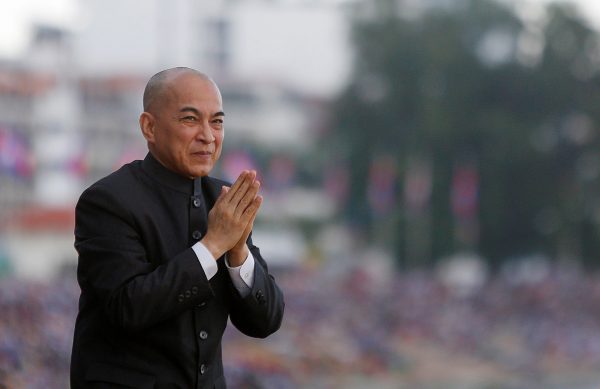The CPP’s performance in these elections will be a crucial litmus test in evaluating its quest for continued control over Cambodia.
The 2013 election result, and the associated mass protests organised by the opposition Cambodia National Rescue Party (CNRP) against alleged electoral fraud, demonstrated the CNRP’s potential to challenge the CPP’s long-term domination of Cambodia.
The CNRP’s strength came from the union of Kem Sokha and Sam Rainsy who together united Cambodians inside and outside the country. While those inside the country delivered the CNRP votes, overseas Cambodians provided the party with financial support. The CPP’s effort to co-opt the CNRP through a ‘culture of dialogue’ based on the principle of mutual non-criticism failed as the CNRP viewed this as a strategy to bind it into a subordinate position. The CNRP was well aware that accepting such a subordinate position would be political suicide — as it was for the royalist FUNCINPEC party, which fell from a major political party in the 1990s to irrelevance.
The CNRP’s determination to stand up to the CPP prompted the ruling party to weaken the CNRP through its control of the judiciary. In 2016, the Cambodian courts found Sam Rainsy guilty of defamation, forcing him to live, initially, in self-imposed exile then political exile following the government’s ban on his return.
The judiciary also found Kem Sokha guilty of failing to appear in court as a witness to his own alleged love affair and sentenced him to six months in jail. Although the government stopped short of arresting him, the verdict forced Kem Sokha to hide in his party headquarters, effectively depriving him of freedom of mobility for several months. With Prime Minister Hun Sen’s blessing, King Norodom Sihamoni pardoned Kem Sokha in early December. But several CNRP leaders and activists remain in jail.
With some of its key leaders immobilised by the courts, the CNRP has faced severe constraints in preparing for the 2017 local elections and the 2018 general elections. Although the CNRP has built a nation-wide organisational structure, the role of party leaders in mobilising electoral support remains critical.
As has been the norm since the 1993 UN-sponsored elections, opposition parties have appealed to the international community to intervene. Overseas development assistance (ODA) constitutes a significant share of the Cambodian government budget, currently approximately 30–40 per cent. Through ODA, Western governments have attempted to pressure the Cambodian government to keep the political space open for oppositional politics. But the impact of Western government on the Cambodian political landscape is declining given the support the CPP has received from China.
Since 1994, China has provided approximately US$10 billion in the form of loans and grants to Cambodia. During President Xi Jinping’s visit to Cambodia in October 2016, China and Cambodia signed 31 agreements, ranging from trade to military cooperation, which further consolidated Sino–Cambodian ties.
The CPP relies on political patronage to maintain elite cohesion and attract popular support. But such practices have led to weak state capacity, inequality and popular alienation. As the anchor of Cambodia’s political patronage centres on the symbiotic relationship between the state/the CPP and businesses, rent seeking activities have ballooned. This in turn has deprived the state of revenues for public services.
The use of small gifts to win electoral support and attempts to categorise voters into the dichotomy of ‘us’ versus ‘them’, has backfired. While the CPP official ‘us’ list was long, the actual number of votes received by the CPP shrank in the 2013 elections as many people outwardly expressed support for the government while secretly supporting the CNRP.
The CNRP’s political momentum has forced the CPP to re-evaluate its policies and strategies culminating in an ‘autocratic upgrade’. Although political patronage remains central to the CPP’s operations, it has changed tactics. In anticipation of the upcoming elections in 2017 and 2018, the CPP further broadened its inclusive distribution policy this year. In rural areas, every family that is in need of help in the event of childbirth, a funeral and/or a wedding is now entitled to ‘gifts’ from the CPP regardless of their party affiliation.
With economic growth for 2016 projected to reach 7 per cent, social sectors, such as health and education, have seen their share of the national budget rise. The CPP has also co-opted the CNRP’s campaign agenda, most crucially in advocating for salary increases for government employees and members of the security forces.
Looking forward, the CPP’s domination will continue to restrict political space even as the government faces pressure from the CNRP and Western governments. To guard against the opposition party, the CPP will continue to make the government more responsive to people’s needs, while using the tightly controlled judiciary to contain its opponents’ ability to mobilise popular support. To counter Western pressure, the CPP government will forge even closer ties with China, which needs Cambodia as a trusted ally to prevent a unified ASEAN stance regarding territorial disputes in the South China Sea.
Kheang Un is Associate Professor of political science at the Northern Illinois University.
This article is part of an EAF special feature series on 2016 in review and the year ahead.‘

